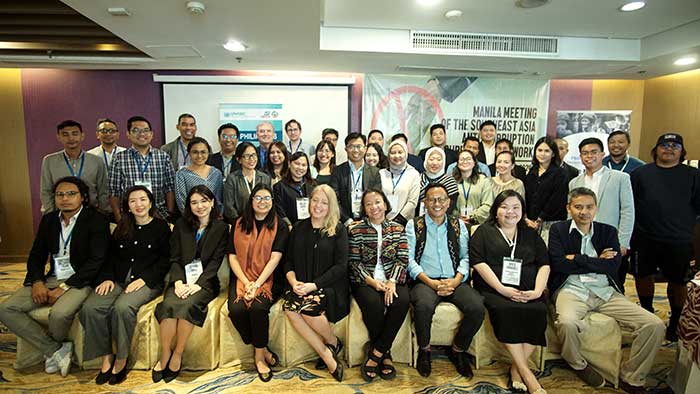
By Joseph Bernard A. Marzan
In a landmark gathering on March 20 in Manila, journalists and media sector organizations from Southeast Asia launched the Journalists Against Corruption (JAC), a new network aimed at fostering collaboration and safeguarding journalists as they report on corruption issues in the region.
JAC aims to unite media practitioners dedicated to investigating and exposing corruption issues and reporting on corruption prevention.
Daily Guardian was the sole news organization from outside Metro Manila invited to participate in JAC.
The network was initiated by the Philippine Center for Investigative Journalism (PCIJ) as the selected lead organization among SEA journalists and organizations, in partnership with the United Nations Office on Drugs and Crime (UNODC).
It also has international support from the Government of Sweden and the United States International Narcotics and Law Enforcement Affairs.
The formation of the network started in Kuala Lumpur, Malaysia in 2023, where PCIJ was tapped to lead the effort.
Beyond the piloting period supported by UNODC, JAC is designed to be a self-sustaining initiative and a platform for national and regional collaborative investigations and training opportunities.
The launch was precluded by a meeting on Tuesday, March 19, with small sessions where journalists identified challenges in investigating corruption within the SEA region. The participants were from the Philippines and its neighbors Cambodia, Indonesia, Laos, Malaysia, Thailand, and Timor-Leste.
These challenges include weaponization of laws against journalists, access issues, physical and online threats, low pay, and lack of opportunities for upskilling and deliberated on possible solutions that the JAC may undertake to overcome them.
Solutions that were agreed upon include a training of trainers on anti-corruption journalism and maintaining communication lines, among others.
PCIJ Executive Director Carmela Fonbuena described the JAC as a platform “for national and regional collaborative investigations and training opportunities,” especially with varied threats within each represented country.
“The urgency of this effort cannot be overstated. We are seeing the decline of civil society and press freedom throughout Southeast Asia. The outlook for open, transparent, and accountable governance systems is bleak. The region also witnessed setbacks in achieving [Sustainable] Development Goal 16, whose targets include peace, justice, and strong institutions,” Fonbuena said.
Mr. Daniele Marchesi, head of the UNODC Office in the Philippines, said in his welcome address that the creation of the JAC “marks a significant step forward in our shared mission.”
Marchesi also emphasized on how the JAC helps the realization of the UN Convention against Corruption (UNCAC), adopted by the UN General Assembly in 2003, which aims to strengthen legal and regulatory regimes to fight corruption.
All countries which were represented during the Manila meeting and launch are signatories to the UNCAC.
The Philippines under the Arroyo administration signed the UNCAC on December 9, 2003, and was ratified by the Senate under the 13th Congress on November 6, 2006, via Senate Resolution No. 108.
“Journalism plays a pivotal role in this fight (against corruption). Investigative journalists shine a light on hidden corruption, holding those in power accountable and bringing injustices to the forefront of the public discourse,” Marchesi said.
“In regions like Southeast Asia, where the challenges of corruption are profound, your stories can inspire change, influence policies, and inspire collective action against corruption,” he added.
Erika Villborg of the Swedish Embassy in Bangkok highlighted the need for support to the network while maintaining their commitment to support this and similar efforts.
“We can see the important role that free and independent media plays in the fight against corruption. Sweden will continue to be a clear voice in supporting an independent and free media and the fight against corruption,” Villborg said.
HOW WILL THIS HELP JOURNALISTS?
Select participating journalists also shared their specific struggles in covering corruption issues in their countries and expressed the importance of the role that the JAC may play.
Linda Trianita from Tempo, an Indonesian publication formed in 1971, first reiterated how their ban in 1994 by the Suharto dictatorship forced them to go underground until the regime fell in 1998, and how press freedom remained threatened even after that.
She said that the formation and launch of the JAC would allow them to be able to collaborate with fellow media practitioners across SEA and beyond on practices and mechanisms.
“We’ve had people throw Molotov bombs at our office, and many of our advertising contracts were cancelled. Our reporters were harassed and threatened for asking the right questions to the right people. It happens until now and it [also] happened to fellow [media in] Indonesia, to Narasi and Project Multa Tulia also,” Trianita described.
“I think the other countries in [SEA] have similar issues, that’s why we need [the JAC]. I hope we can grow together and strengthen together, and collaborate in the future, about anti-corruption issues,” she added.
The Nation’s Patpon Sabpaitoon from Thailand said that the JAC reinforces the role of journalists in the region.
“In every corner of our world, there are stories of corruption, injustice, and deceit, waiting to be told. These stories require dedication, courage, and resolve of those willing to dig deeper—you [journalists],” he said.
“Now that we have the [JAC], all the crooks of the world, behold. A journalist is usually loud. A band of journalists is usually loud and scary. We see you, and we are coming for you,” he added.
Fernando Antonio da Costa of Timor-Leste’s Neon Metin highlighted that the JAC was not about the journalists themselves, but the public that they serve.
“It’s about [the] people down there who need the truth. School funding [is] being taken off, health services are being taken out because of some guys out there are making money for themselves. That’s where in Neon Metin, we always encourage our journalists, if we go for investigative journalism, we go for impact,” da Costa said.




















